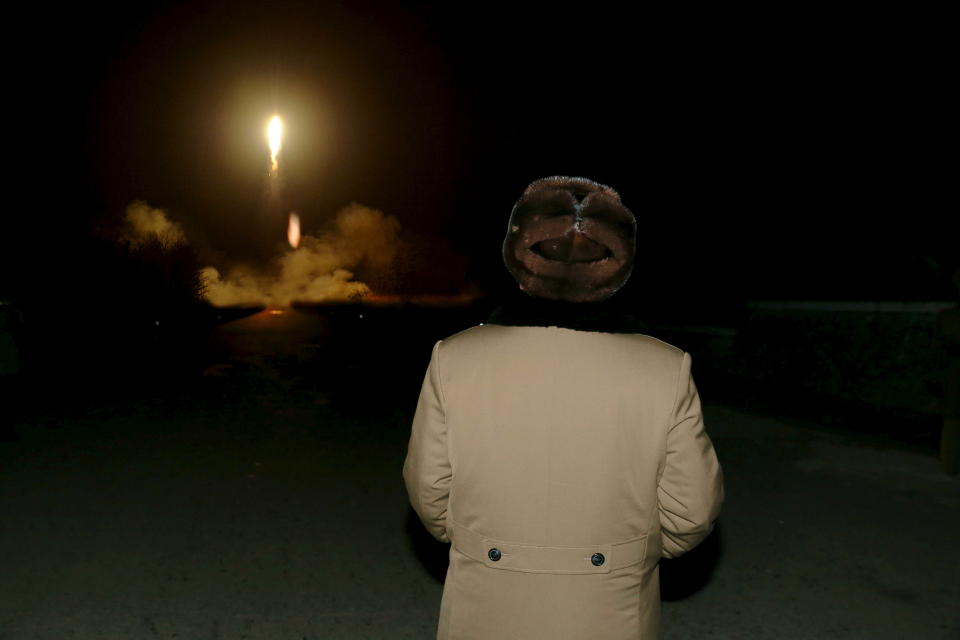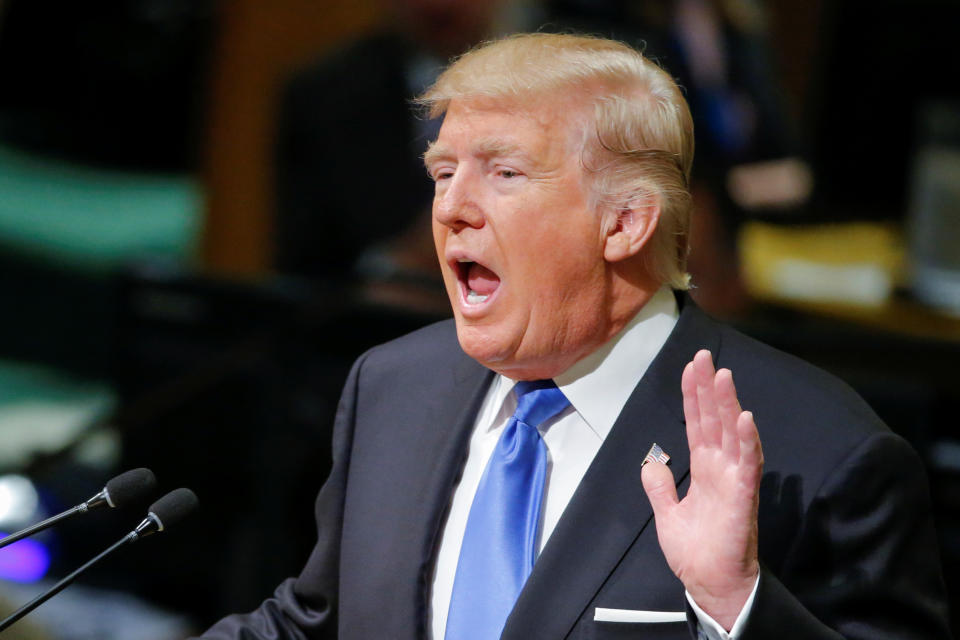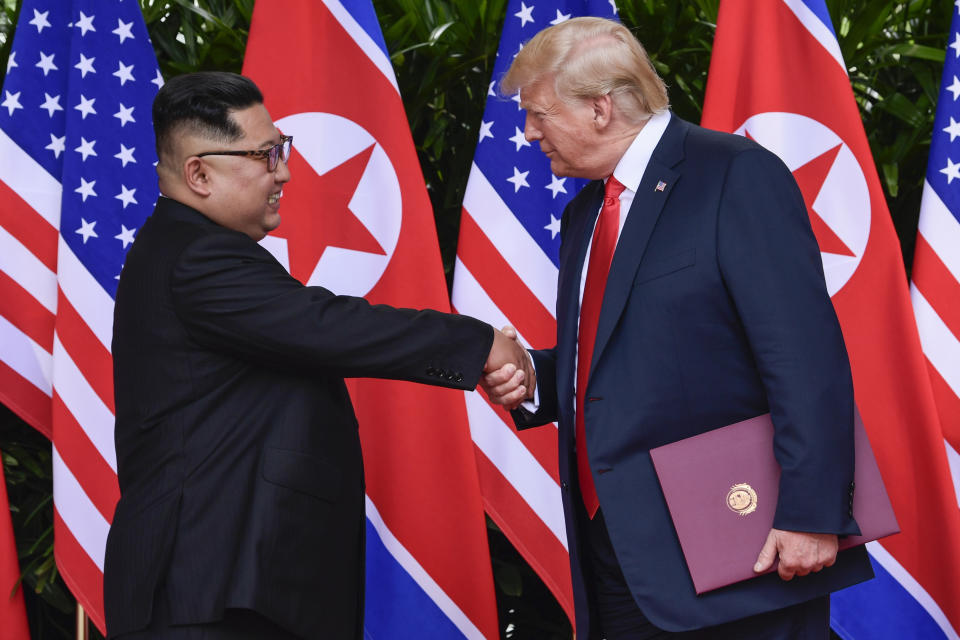What to expect — or fear — when Trump meets Kim again

As the date approaches for a second summit between President Trump and North Korean dictator Kim Jong Un, America’s top intelligence official is warning the country not to set expectations too high. In testimony this week before the Senate Intelligence Committee, Director of National Intelligence Dan Coats went so far as to question whether the central U.S. goal of the talks — North Korea’s complete and verifiable denuclearization — was realistically achievable.
“We currently assess that North Korea will seek to retain its [weapons of mass destruction] capabilities and is unlikely to completely give up its nuclear weapons and production capabilities because its leaders ultimately view nuclear weapons as critical to regime survival,” said Coats, whose remarks were widely construed as contradicting Trump’s view of relations with Korea (and several other foreign policy issues as well, including the Iranian nuclear deal). Coats and the other intelligence chiefs were later summoned to the White House to explain themselves, after which Trump told the New York Times that their testimony had been “mischaracterized by the media.”
Commentators wondered where Trump was getting his information, if not from Coats, CIA director Gina Haspel and other intelligence agencies. But on Thursday, Steve Biegun, the administration’s special representative for denuclearization talks with North Korea, backed the president, publicly criticizing the intelligence agencies’ as incomplete and flawed. “I entirely share President Trump’s frustration with the way this intelligence information was briefed and played out,” Biegun said in remarks at Stanford University. The intelligence assessment, he argued, failed to adequately take into account the Trump administration’s ongoing policy of offering an assortment of “sticks and carrots” — i.e. pressure and incentives — to convince North Korea to dismantle and destroy its nuclear weapons and long-range missile capability.
“If you take the [intelligence assessment] out of context, and divorce it from policy, then you have a very incomplete picture,” said Biegun. “That’s really where my frustration is with the story that played out this week.”
In fact, Biegun noted that North Korean leader Kim Jong Un had committed unequivocally in an October meeting with Secretary of State Mike Pompeo in Pyongyang to the total dismantlement and destruction of all North Korean plutonium and uranium enrichment facilities, without which new nuclear weapons could not be built (although the ones they already have would presumably remain in their hands pending future negotiations). Still, that would constitute a major step towards the bedrock U.S. goal of a “final, fully verified denuclearization” that Biegun insisted would ultimately include elimination of “all weapons of mass destruction, their means of delivery and the means to produce them.”

In exchange for complete denuclearization, Biegun said, President Trump was prepared to offer incentives that “exceed anything previously thought possible.”
The nearly unprecedented gulf between the Trump administration’s own assessments of secret, ongoing denuclearization talks makes judging their progress and prospects difficult even for seasoned experts. Ambassador Wendy Sherman is a former Under Secretary of State for Political Affairs who negotiated with North Korea during the Clinton administration and more recently led the U.S. negotiating team that concluded the 2015 Iran nuclear deal.
“Steve Biegun is a talented and tough negotiator, and if the Trump team really is able to convince North Korea to make a comprehensive declaration of all its WMD [weapons of mass destruction] facilities and then verifiably destroy them, I will be happily surprised,” Sherman said in an interview. “However, given the lack of real movement in that direction we saw after the last summit, and the intelligence community’s very different recent assessment, I believe that the prospect for success is quite low.”
The divergence of opinion on the denuclearization talks even within the Trump administration reflects both the complexity of the issue and the enormous geopolitical — and domestic political — stakes involved. If the Trump administration is truly successful in eliminating North Korea’s nuclear weapons and long-range missiles while defusing tensions on the Korean peninsula, for instance, it would indeed solve one of the most intractable conflicts of the Cold War era, and represent a legacy-defining achievement for the president.
But many arms-control experts fear that President Trump, given his eagerness for a deal and his well-known disdain for detail and careful preparation, could give away too much, too soon in what should be a careful, step-by-step process of mutual concessions. That could undermine U.S. alliances in Asia, greatly advantage China, and leave the United States and its allies still vulnerable to nuclear intimidation and brinksmanship from North Korea.

North Korea has already made clear in advance of the second summit that it wants immediate sanctions relief, massive financial incentives, and a peace agreement to formally end the Korean war, which has been stalemated by a truce since 1953. Such a treaty would undercut the rationale for continuing to station U.S. troops in South Korea, a bedrock of American policy in the Pacific. As recently as December, North Korea issued statements suggesting that denuclearization must also include the United States lifting its nuclear deterrent umbrella over allies South Korea and Japan.
“I do worry about Trump announcing troop withdrawals from South Korea before getting any real concessions from North Korea, or setting up a reported ‘escrow account’ of billions of dollars for Pyongyang without monitoring or verification of denuclearization in place,” said Sherman, currently professor of practice at Harvard’s Kennedy School and director of its Center for Public Leadership. “I also worry that North Korea seems to prefer dealing directly with President Trump, and this desire for leaders to deal directly with each other only works when there is adequate preparation and a diplomatic operational plan in place. A ‘bromance’ is not a substitute for persistent, painstaking, tough negotiations.”
Indeed, ever since then President Barack Obama privately told President-elect Trump that North Korea’s burgeoning nuclear weapons and intercontinental missile programs were the chief danger the United States would confront during his term, the showdown with Pyongyang was destined to be the critical test case for Trump’s unconventional brand of mano-a-mano, top-down, shoot-from-the-lip diplomacy.
After belittling Kim as “Little Rocket Man” and using a 2017 speech to the U.N. General Assembly to claim his adversary was on a “suicide mission” that could totally destroy North Korea, Trump shocked the foreign policy establishment and overrode the advice of his own top advisers by quickly accepting Kim’s offer of a summit meeting. Following a summit last year in Singapore that was full of flattery and pageantry, but remarkably light on specifics and details, Trump committed to provide vague “security guarantees” to North Korea in exchange for Kim’s promise of “complete denuclearization of the Korean Peninsula.”

On his way home from the Singapore summit, Trump tweeted prematurely that “There is no longer a Nuclear Threat” from Pyongyang. During one of his subsequent campaign-style rallies, Trump went further in describing his evolving relationship with the North Korean strongman. “He wrote me beautiful letters,” Trump said of Kim. “And they’re great letters. We fell in love.”
The Trump-Kim “bromance” will be tested at the second summit scheduled for the end of this month, most likely in Vietnam. Both leaders will be under pressure to add substance and specifics to the vague denuclearization proclamations in Singapore, and to move beyond the current status quo of a freeze in North Korean nuclear and long-range missile tests, in exchange for Trump’s freezing U.S. military exercises with South Korean counterparts. The Trump administration originally rejected China’s proposal for such a “freeze for a freeze” deal, and senior U.S. military officials say it is not sustainable.
“The ability of the United States military to be able to execute our plans at the level we need to in order to counter North Korea’s conventional military capability, especially given their location close to [the South Korean capital of] Seoul, needs to be exercised several times a year, because it’s extremely complex,” retired General Walter “Skip” Sharp, the former commander of U.S. and combined forces in Korea, told me last year at the Center for Strategic and International Studies. “So the current ‘freeze for a freeze’ is not sustainable from a military perspective.”
After U.S. and South Korean negotiators failed to reach a cost-sharing agreement at the end of 2018 — with the U.S. side unsuccessfully demanding that South Korea significantly increase its share of the burden of supporting 28,500 U.S. troops on the peninsula — many experts worry that Trump could announce a unilateral troop withdrawal as a means to sweeten the pot at the upcoming U.S.-North Korea summit. Those concerns were significantly heightened recently after Trump’s surprise announcement of U.S. troop withdrawals from Syria and Afghanistan, which prompted the December resignation-in-protest of former Defense Secretary Jim Mattis.
William Tobey is a former deputy administrator for Defense Nuclear Nonproliferation at the Nuclear Security Administration. The devil in complex nuclear arms control and disarmament agreements, he agrees, is always in the details. That’s another reason the North Koreans prefer to negotiate directly with Trump, who is famously uninterested in the nitty-gritty details that might stand in the way of a beautiful deal.

“It not surprising that the North Koreans want to deal directly with President Trump, because it’s greatly to their advantage,” Tobey said in an interview. “In a denuclearization deal the details surrounding a comprehensive declaration, verification, dismantlement and removal of weapons and materials matter a lot, and those are simply not the sort of things that President Trump is going to discuss with Kim. If the North Koreans can keep the discussion with Trump at the conceptual level, they have a much better chance of getting what they want, possibly without giving up all of their nuclear weapons capabilities. That would leave the United States and its allies vulnerable.”
“The pressure on Trump and Kim to reach some sort of interim deal in the next summit will be high, and the list of North Korean demands is long, to include sanctions relief, a possible peace declaration, and a continued freeze on U.S.-ROK [Republic of Korea] military exercises,” said Sue Mi Terry, a former senior Korea analyst at the CIA, and currently the Korea chair at the Center for Strategic and International Studies. Given the recent breakdown in U.S.-South Korea burden-sharing talks, she noted, the biggest “wild card” in the upcoming summit is the possibility that Trump will threaten to withdraw U.S. troops, or even announce a pullout now that Defense Secretary Mattis is not around to dissuade him.
“That would be a very big blow, but Kim knows that Trump is the only American president in history who might be willing to put our alliances on the negotiating table,” said Terry. “That’s why he keeps writing Trump love letters.”
James Kitfield is a senior fellow at the Center for the Study of the Presidency and Congress.
_____
Read more from Yahoo News:


